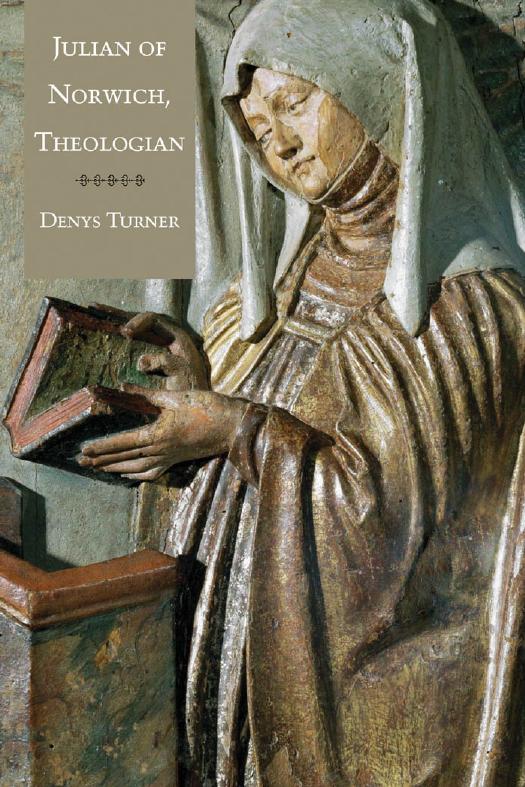Julian of Norwich, Theologian by Denys Turner

Author:Denys Turner
Language: eng
Format: epub, pdf
Publisher: Yale University Press
Published: 2007-03-17T04:00:00+00:00
Cur Deus Homo? Julian and Duns Scotus
At this point Julian’s soteriology edges onto ground intensely contested in theologies of the High Middle Ages concerning the terms in which appropriately to answer the Anselmian question Cur Deus homo?—why did God become man? J. P. H. Clark has suggested that Julian’s answer to that question is closely related to that of Duns Scotus, and, having thus far read Julian’s soteriology in Denise Baker’s terms, we can see why. For Scotus, the Fall was not, as for the majority of medieval theologians, “the primary cause of the Incarnation.” Rather, Scotus maintained, “Christ, and the humanity of which he is the head, is willed for the sake of God.”56 To put it simply, it is out of and for the sake of the divine love and goodness itself that humanity was created; and it was for that same love and goodness’ sake, not for any contingent end of subsequent remedy of sin, that Christ was willed to become through the Incarnation humanity’s head. If indeed within the wider perspective of humanity’s predestined glory the Fall is foreseen by God along with its remedy; if indeed “it is in view of the Fall that Christ comes specifically as Redeemer,”57 nonetheless, had, counterfactually, there been no Fall, the Incarnation was in any case eternally willed by God and would have happened simply because God out of an eternal love willed to close the gap of separation that had fallen between human beings and their Creator. According to Scotus, therefore, the Incarnation’s “necessity” does not derive from the requirements of a fact, namely, the fact that humanity did fall, but—if indeed this is a form of “necessity”—as the simple expression and outpouring of the divine love as such. Or, as Scotus himself puts it: “incarnatio Christi non fuit occasionaliter praevisa,” “the incarnation of Christ was not foreseen [as something that would happen] as if occasioned by anything.”58 Therefore, it was not occasioned by the Fall.
It is not difficult to see why Scotus should say such a thing, nor why Clark should observe similarities between his position and Julian’s. But if there are similarities, there are also differences. On the side of similarities, Julian’s soteriology is, as we have seen,59 very far from envisaging the Incarnation as a kind of reactive response to the Fall, and it would seem that it was with a view to the removal of any such implication that Scotus insists that the Incarnation was eternally willed in the divine providence independently of the fact of the Fall, hence not occasionaliter. Of course, Scotus does not deny that the Fall was foreseen. Similarly, Julian’s Lord and Servant parable lays great stress on the Fall’s having been eternally anticipated. For his part, Scotus insists that God “preordained or foresaw [the Incarnation] . . . as a remedy against the Fall,”60 and thus far he and Julian are in agreement. But where Scotus appears to differ from Julian is in his maintaining that were the provision
Download
Julian of Norwich, Theologian by Denys Turner.pdf
This site does not store any files on its server. We only index and link to content provided by other sites. Please contact the content providers to delete copyright contents if any and email us, we'll remove relevant links or contents immediately.
| Anthropology | Archaeology |
| Philosophy | Politics & Government |
| Social Sciences | Sociology |
| Women's Studies |
The remains of the day by Kazuo Ishiguro(8977)
Tools of Titans by Timothy Ferriss(8366)
Giovanni's Room by James Baldwin(7330)
The Black Swan by Nassim Nicholas Taleb(7109)
Inner Engineering: A Yogi's Guide to Joy by Sadhguru(6785)
The Way of Zen by Alan W. Watts(6601)
Asking the Right Questions: A Guide to Critical Thinking by M. Neil Browne & Stuart M. Keeley(5759)
The Power of Now: A Guide to Spiritual Enlightenment by Eckhart Tolle(5755)
The Six Wives Of Henry VIII (WOMEN IN HISTORY) by Fraser Antonia(5498)
Astrophysics for People in a Hurry by Neil DeGrasse Tyson(5182)
Housekeeping by Marilynne Robinson(4436)
12 Rules for Life by Jordan B. Peterson(4299)
Double Down (Diary of a Wimpy Kid Book 11) by Jeff Kinney(4261)
Ikigai by Héctor García & Francesc Miralles(4247)
The Ethical Slut by Janet W. Hardy(4242)
Skin in the Game by Nassim Nicholas Taleb(4239)
The Art of Happiness by The Dalai Lama(4125)
Skin in the Game: Hidden Asymmetries in Daily Life by Nassim Nicholas Taleb(3991)
Walking by Henry David Thoreau(3953)
